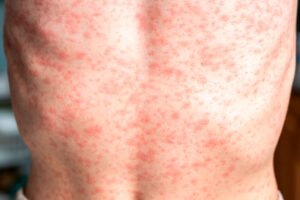By Nicole Garcia
Respiratory syncytial virus (RSV) is a common and serious cause of respiratory infections, especially in children and older adults. Despite its global impact, no specific treatment or licensed vaccine for RSV exists for children. However, recent developments in immunoprophylaxis and vaccine candidates have raised new hopes and opportunities for preventing and controlling RSV infections. In this article, we review the current state of knowledge and research on RSV epidemiology, evolution, diagnosis, clinical management, and prevention in Canada.
Epidemiology and evolution: RSV is a highly contagious virus that infects the respiratory tract and causes various symptoms, from mild cold-like illness to severe pneumonia and bronchiolitis. RSV is responsible for millions of hospitalizations and deaths worldwide every year, particularly among young children, older adults, and people with chronic conditions. In Canada, RSV is a leading cause of acute lower respiratory tract infection (LRTI) in infants and young children, accounting for up to 28% of all episodes of LRTI 1. RSV seasonality in Canada varies by region and year, but typically occurs from late fall to early spring, with peak activity in December and January 2.
Diagnosis and clinical management: RSV diagnosis in Canada is usually based on the detection of viral antigens or nucleic acids in respiratory specimens, using rapid tests or molecular methods. However, these tests have limitations in terms of sensitivity, specificity, availability, and cost. Moreover, RSV diagnosis is often complicated by co-infections with other respiratory viruses, such as influenza, coronavirus, and rhinovirus. RSV clinical management in Canada relies mainly on supportive care, such as oxygen therapy, hydration, and mechanical ventilation. Antiviral therapy with ribavirin is restricted to severe cases in immunocompromised patients, due to its toxicity and limited efficacy. Therefore, there is an urgent need for more accurate, rapid, and affordable diagnostic tools, as well as for more effective and safe antiviral drugs for RSV infections.
Prevention: RSV prevention in Canada is currently achieved by passive immunization with monoclonal antibodies (mAbs) or active immunization with vaccines. The only approved mAb for RSV prophylaxis is palivizumab, which is administered monthly to high-risk infants during the RSV season. However, palivizumab is expensive, cumbersome, and not widely accessible. A newer mAb, nirsevimab, has shown promising results in a large clinical trial, as it provides protection for a whole season with a single dose and has a broader target population. Several vaccine candidates for RSV are under development, targeting different age groups and routes of administration. The most advanced ones are based on the fusion glycoprotein (F) in its prefusion conformation (PreF), which induces potent neutralizing antibodies. GSK’s RSV vaccine, which is based on PreF, was approved by Health Canada in August 2023 for adults aged 60 and over 3. This is the first approved RSV vaccine in Canada and offers new possibilities for reducing the burden of RSV infections in older adults.
RSV is a major public health problem that requires more attention and investment from the scientific and medical communities in Canada. The recent advances in RSV prevention are encouraging and offer new possibilities for reducing the burden of RSV infections. However, there are still many gaps and challenges in RSV research that need to be addressed, such as the impact of the COVID-19 pandemic on RSV epidemiology and evolution, the development of better diagnostic and therapeutic options, and the evaluation of the long-term effectiveness and safety of RSV vaccines.
Sources:
- Piralla, A., Chen, Z. & Zaraket, H. An update on respiratory syncytial virus. BMC Infect Dis 23, 734 (2023). https://doi.org/10.1186/s12879-023-08730-x
- Seasonality of Respiratory Syncytial Virus — United States, 2017–2023 | MMWR (cdc.gov)
- How seniors can access 4 key vaccines this fall — for COVID, flu, pneumonia, and RSV | CBC News





